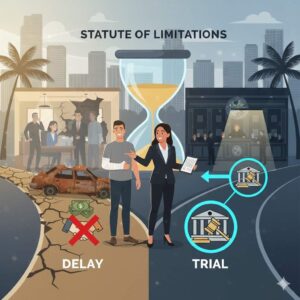Miami has experienced a worrying increase in the number of slip and fall or tripping incidents if we talk about personal injury claims. Falling down by chance may cause different types of physical damages like fractures, brain injury, and spine injuries. The thing to be done here is to determine who is responsible for the falling and slipping incidents, as a complaint for pain relief has to be filed in case of these incidents. This part of the manual guide indicates a person’s capability to excavate sensitivity by the slip and fall of a locality within Miami.
Understanding Negligence in Slip and
Fall Claims Of Non-conformity Is a cause of many personal injury cases like slip and fall ones. You should be able to provide evidence that the building proprietor or the responsible person did not take the inherent safety measures to avoid such accidents and that they are, therefore, directly responsible for the damage caused to you by their negligence.
In a slip and fall claim, negligence in Miami consists of:
- Duty of Care: The property owner or manager must ensure that the surroundings are safe.
- Breach of Duty: The owner or manager did not comply with this obligation.
- Causation: The breach directly contributed to the incident where someone slipped and fell.
- Damages: The victim suffered actual damages resulting from the accident like medical costs, loss of earnings or pain and suffering.
Step 1: Establishing the Duty of Care
Before bringing a negligence action, you must prove that the other party owed you a duty of care. In light of this, all Miami property owners must assure the security of their establishments for guests. The technique in which you determine what sort of visitor you have leads in a classification into three types depending on the need for the duty of care. The categories are:
- Invitees: These are individuals invited onto the property for business purposes, such as customers in a store. Property owners owe the highest duty of care to invitees and regularly inspect and maintain such premises.
- Licensees: They include people like social guests who visit the property for personal reasons. There must be warnings about any known hazards on their part as far as licensees go.
- Trespassers: A person who enters without permission is termed as trespassers. With regards to trespassers, property owners would only owe them a minimum duty but should not cause willful injuries.
Step 2: Demonstrating a Breach of Duty
The first step to prove the duty of care is to show that property owner or manager breached their responsibility. Common slip and fall cases are those in which you might ignore dangerous conditions:
- Wet or slippery floors without warning signs
- Cracked or uneven pavement
- Inadequate lighting in walkways or stairwells
- Debris or obstacles in common areas
- Lack of handrails on stairs
It can be proved that a breach of duty has occurred when the owner of the property is informed that its state is dangerous or should have been informed but did not take any actions.
Step 3: Proving Causation
Causation is a component of many negligence cases which is seen as a key part of an imperative case. It is a duty to prove that your fall and slip incident was the final effect of lack of compliance with the safety of the property by the owner. The harm done owing to the hazard has to be visually clear.
For example, if you fell on increased surfaces at a supermarket, then you must illustrate that your fall was due to lack of warning signs or failure to clean the spillage. Medical documentation, scene pictures, and professionals’ statements can assist in establishing causation.
Step 4: Documenting Damages
And finally, for you to win a slip and fall lawsuit, you have to demonstrate that the accident has caused some harm to you. Damages can be things like:
- Medical Expenses: This encompasses the costs such as hospital charges, physical therapy, medicine, and any other cost that would be incurred on treatment of the condition.
- Lost Wages: If working is prevented that touching your injuries, there is a possibility that you will be paid what you have lost.
- Pain and Suffering: It takes care of the tangible suffering as also the anguish emerging out of the accident.
- Loss of Pleasure in Living: If because of the injury the satisfaction in day-to-day activities has gone down, you might get compensated for this amount of dollars.
Keep detailed records of your medical treatment, time missed from work, and other expenses related to your injury. These records will be important in supporting your claims against damages incurred by you during such accidents.
Comparative Negligence in Miami
The comparative negligence rule which governs Florida state law must not be ignored at any cost. In other words, plaintiff’s recoveries may be reduced based on their percentage of responsibility for the accident. For instance, if you were sending text messages on your phone while strolling down the road and fell down on soggy ground, then the court could declare you liable for 20 percent of that accident. Thus, your compensation will dip by 20 percent.
To ensure that no money is lost from your settlement protect this with evidence however little it may sound and choose a lawyer who can defend against potential cases with respect to comparative negligence.
Tips for Strengthening Your Slip and Fall Claim
Proving you were careless during a slip and fall claim can be challenging. However, there are certain measures that may help fortify your argument:
- Report the Incident: Once an accident occurs, inform the owner or manager of the property then ensure a report of the incident is filed.
- Collect Evidence: The location of the accident needs to be photographed alongside spill areas that caused your fall. Additionally, obtain contact information for witnesses who were there during this period.
- Seek Medical Attention: Anytime an injury is sustained it is important first seek medical help irrespective of what appears as minor injuries at times; these records could play a crucial role in any lawsuit that follows.
- Be careful about statements: Do not provide statements to adjustors from various insurance companies nor sign any documents without seeking advice from your lawyer first.
- Consult an attorney: Experienced attorneys can be very helpful in making sure that you get good money as far as slip and fall cases are concerned because they are complicated matters with lots of legal procedure involved—their knowledge greatly increases chances of receiving justice against negligent companies who don’t care about their clients’ wellbeing.
Conclusion
Regrettably, negligence in claims for slip and fall cases in Miami is seen as an impossible undertaking without the necessary legal elements and attention to detail. The best approach that you can use to win your case is by establishing the duty of care, showing its breach, proving causation and documenting your damages among others. Consequently, you will have a strong case against your opponent and increase your chances of getting good compensation.



